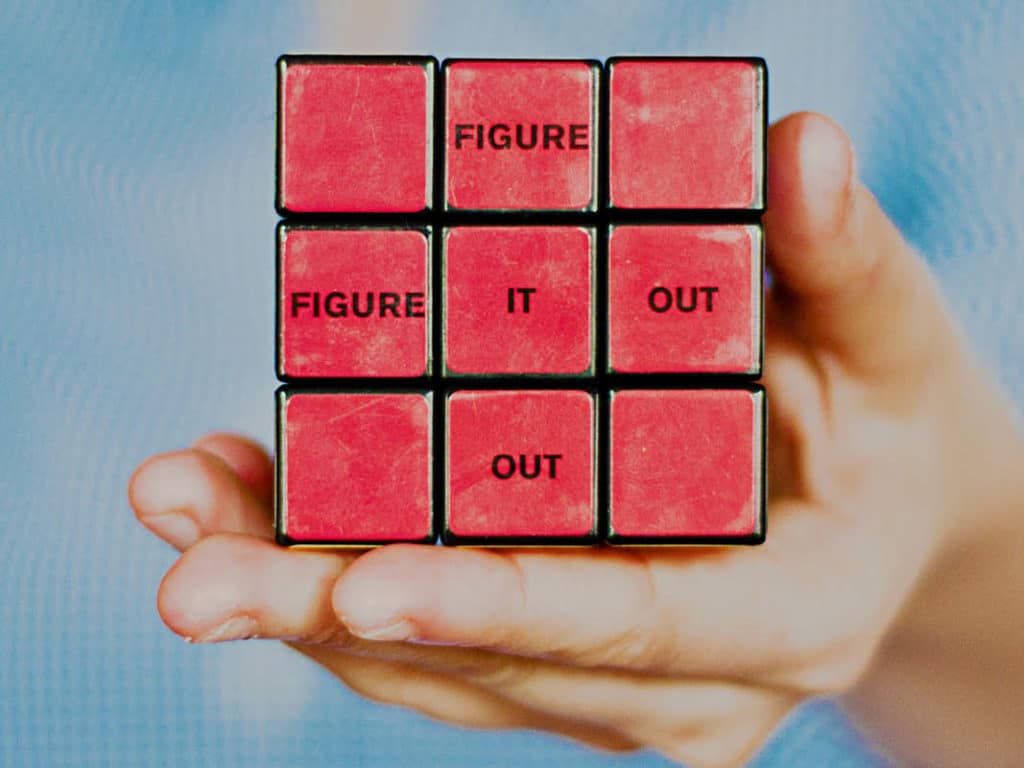As business advisers, a lot of the work that we do at the Advisory Collective inevitably falls under the heading of “problem solving”, with and for our clients.
Now one of the remarkable things about problems is that everyone has them – even Jay Z has 99 problems, or so I’m told… but most of us have never been trained in how to solve them. Which is the logical thing to do, when thinking about a problem, right? Well… maybe !
So here’s my “top 20” on how to solve problems, which I’ve learned from 30+ years in business… because no-one ever trained me either, so I had to “learn by doing”:
- Solve your own problems before you solve others’. Some people are generous “to a fault”… and some people try to take advantage of others. Even when helping well-intentioned people, remember the old airline safety rule: “fit your own oxygen mask before assisting others”.
- Rank problems based on both “Urgent” and “Important”. Important can sometimes trump Urgent. Only you can really know what’s Important for you. And a lot of problems appear at first glance to be more Urgent than they really are.
- Solve the prioritised problems on your plan before creating new ones. But don’t ignore the Urgent AND Important ones just because you didn’t plan for them. No plan is perfect, and Elon Musk is still working on a time machine.
- Don’t create a bigger problem by solving a small problem. “From little things, big things grow”. Sometimes bad things. Someone once thought it would be a good idea to import rabbits into Australia for hunting, and see how that solution turned out.
- Be authentic and consistent in your problem-solving behaviours, when dealing with others. Inauthenticity or inconsistency in personal dealings creates doubt and distrust. And people will talk about you, when you are not in the room. That’s what some call a personal brand.
- Multifaceted, “win-win” solutions are often better than single point solutions. That’s why I call them “elegant solutions”. For example, introducing career development programs into your business can improve talent attraction, engagement, retention AND productivity. But they aren’t always available.
- Sometimes you can solve a problem by doing nothing – in fact it may not even BE a problem. But that’s rare, especially in the case of Important problems, and over the longer term.
- Simple solutions are often better than complex solutions. Sometimes a complex problem can be solved by a simple solution that goes to the heart of that problem – but not always. One trick is to look for “root causes”… diagnosing and addressing those directly might make a complex problem easier to solve.
- If you ignore a genuinely Important problem, it will eventually come back. Usually with sharper horns and fangs, in my experience. See number 4.
- No two people will ever see the same problem the same way. Or the available options. When they collaborate well, teams will often come up with a better solution than one person can do alone. And if you don’t have a team, you should probably ask an expert for help.
- On the other hand, don’t settle for a compromise that no-one wants. That usually leads to resentment. Resentment kills trust and doesn’t solve any problems; in fact they usually make new and worse ones.
- When in doubt choosing between two problems, or two solutions, prioritise your alternatives based on your Purpose, Values and Goals. So it helps to have a clear Purpose, Values and Goals first, yes?
- The worst time to solve a problem is when you are tired, stressed or distracted. Sleep on it – it works. It might also help to write the problem down and then look at it again tomorrow. And if you can’t sleep, do your ironing. Your family will be grateful, and then you can go back to sleep.
- When considering advice about how to evaluate or solve a problem, give your preference to experts over amateurs. And people who love you rather than people who may have their own selfish agendas.
- If you genuinely need more time to solve a problem, ask for it. But don’t use that as an excuse to procrastinate.
- Remember that not every solution works as planned. But very few problems are fatal, fortunately. “Learning by doing” is how most successful people and businesses get better.
- If you do make a mistake solving a problem that affects others, apologise and ask for forgiveness. Good people will usually understand. Don’t worry so much about what bad people think about you – there’s probably not much you can do about them anyway.
- Most smart and decent people overestimate their problems and underestimate their resources. Isn’t that ironic ? Foolish and lazy people tend to have it the other way around. Give yourself a break.
- Don’t mistake feelings for instincts when making a decision. Instincts are emotionally charged judgements based on sometimes subliminal perceptions and informed by experience. Raw feelings are much cruder and can make us do stupid things, if we give in to them.
- The heart and the head need each other, to survive and thrive. Let them work together, when considering problems and solutions – that’s how you develop good instincts, after all.
So here’s my current problem – I need to add something else, but I really like 20 as a round number. But actually 21 is just a number too. So I guess that’s not a problem after all (remember number 7?):
21. Solving problems is the best way to learn how to solve problems. You will get better, the more you practice
What Urgent AND Important problem do you need to solve today? And what help might you need to do that?
Oh… and do drop us a note if you need help. We like solving problems.
